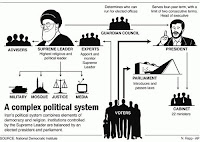When the Divide & Rule tool runs amok !
Erich Fromm once said ;
"The obsession with violence and destruction . . . are only further instances of the powerful attraction of necrophilia in the contemporary world."
Keeping this in mind, in retrospect a Selvam Canagaratna interestingly concludes the following.....
“One can’t teach old dogs new tricks, right? …….. Dead right!
Worth remembering that for close upon three decades between the end of the 20th Century and the dawn of the New Millennium the US has, if anything, stubbornly persisted only in re-learning all the wrong lessons in the Middle East. [There’s ‘American Exceptionalism’ for you!]
A few random examples will suffice to make the point:
* At a state dinner in Tehran on New Year’s Eve, 1977, US President Jimmy Carter toasted the Shah by describing him as "an island of stability in the troubled Middle East", and went on to pay glowing tribute " to your leadership and to the respect and the admiration and love which your people give to you." [Some love, that, as it manifested itself not long after!]
* Thirty-two years later, the current US Vice P resident, Joe Biden, claimed on the record that Egyptian President Hosni Mubarak wasn’t ‘a dictator’ simply because he was an American ally and a friend of Israel – a logic that seemed to have meaning for Biden alone.
* Biden’s idiotic claim aside, the then Secretary of State Hillary Clinton jumped haughtily into the maelstrom by claiming that the Egyptian President ". . . and Mrs. Mubarak are friends of my family."
* This one takes the cake, of course. Binoy Kampmark, a regular contributor to Counter Punch magazine caught the exquisite irony best: "What balm, then, do we apply to the sores of the [Middle East]? The most characteristic response, in its schizophrenic combination of imperial sentiment, selective paternalism and scorn, is that of Philip D. Zelikow, Director of the Miller Centre of Public Affairs at the University of Virginia. In the New York Times (July 4), he suggested that the US ‘quarantine’ the Middle East."
Added Kampmark: "Zelikow’s work, when kept in its own quarantine behind desk and ordered paper, has its high points. His collaboration with Ernest May and Richard Neustadt at Harvard did yield a valuable bounty on the way history is distorted in the maze that is policy making."
Former US diplomat Hillary Mann Leverett writing on Robert Parry’s Consortium news website noted that America’s efforts to ‘use’ autocrats willing to facilitate US military aggression to promote American hegemony over the Middle East had proved unacceptable to the vast majority of people there.
"Three days after Mubarak’s removal, large-scale protests paralyzed Bahrain – home of the US Fifth Fleet – underscoring the threat to America’s regional hegemony even more dramatically," she wrote.
Faced with these risks to its hegemonic ambitions, the US could not simply declare its opposition to popular sovereignty in the Middle East. Instead, the Obama administration crafted a policy response to the Arab Awakening that had three major goals:
First, to prevent the ‘Arab Awakening’ from taking down any more US allies. To that end, the administration tacitly (but happily) acquiesced to the Saudi-led military intervention in Bahrain in 2011, to sustain the Khalifa monarchy, so that US naval forces can continue operating out of Bahrain.
Second, to co-opt the ‘Arab Awakening’ for US purposes, by showing that, at least somewhere in the Middle East, the US could put itself on the ‘right side of history’. So, when Saudi Arabia offered the Arab League as ‘cover’ to intervene in Libya and arm anti-Gaddafi rebels, President Obama overrode objections by his Defense Secretary and military leaders to order US forces into action.
Thirdly, the goal was to show that, after the loss of pro-Western regimes in Tunisia, Egypt, and near-misses in Bahrain and Yemen, it wasn’t just authoritarian regimes willing to subordinate their foreign policies to the US that were at risk from popular discontent. Washington wanted to demonstrate that it was also possible to bring down regimes with clear commitments to foreign policy independence – and, in the process, weaken not just Iran’s strategic position but that of Islamists across the region promoting participatory Islamist governance.
Though it was clear from the start that arming a deeply divided opposition would not bring down the Syrian government, Washington joined with its so-called allies in Riyadh, Paris, and London in an almost desperate attempt to roll back Iran’s rising power.
Almost three years on, both Iraq and Iran have been hurt by this misadventure – but the American and the Syrian people have paid a much higher price. Washington has paid in terms of its regional standing, intensification of the regional resurgence of violent extremists, and further polarization of relations with Russia and China; Syria, of course, has paid with over 100,000 Syrians killed (so far) and millions more displaced.
The Obama administration’s tacit backing for the military coup that overthrew Egypt’s democratically-elected President Mohamed Morsi (leader of the Muslim Brotherhood) in July 2013 has removed any residual doubt of US intent to cling to its hegemonic prerogatives in the Middle East.
Pepe Escobar, in Asia Times, recalled tongue-in-cheek that "Once upon a (very recent) time, the US government used to help only ‘good terrorists’ (in Syria), instead of ‘bad terrorists’. That was an echo of a (less recent) time when it was supporting only ‘good Taliban’ and not bad Taliban’."
He went on to ask: "So what happens when Brookings Institution so-called ‘experts’ start blabbering that the Islamic State of Iraq and Sham (ISIS) is really the baddest jihadi outfit on the planet (after all they were cast out of al-Qaeda)? Are they so badass that by warped newspeak logic they’re now the new normal?"
In Escobar’s estimation, the ISIS objective is not to invade Baghdad but to accelerate the balkanization – and eventual partition – of both Syria and Iraq. He was also convinced ISIS was not a CIA brainchild, they being "in fact the bastard children of (disgraced) Bandar Bush’s credit card largesse."
Neo-con propaganda denouncing the US government for being in bed with Tehran against ISIS is, once again, in Escobar’s view, disinformation.
"The fact that ISIS is not directly in Langley’s payroll does not imply their strategic agenda essentially differs from that of the Empire of Chaos. The Obama administration may be sending a few marines to protect the swimming pools of the largest, Vatican-sized embassy on Planet Earth, plus a few ‘military advisers’ to ‘retrain’ the dissolving Iraqi Army. But there’s no evidence Obama is about to authorize ‘kinetic support’ against ISIS, even though Baghdad has already green-lighted it."
The official view in Teheran was that the US was manipulating the Takfiri terrorists to tarnish the image of Islam and Muslims. Iran’s Speaker of the Majlis, Ali Larijani, gave voice to similar sentiments: "It is obvious that the Americans and the countries around it have made such moves. . . Terrorism has grown into an instrument for the big powers to advance their goals."
Concluded Escobar: "Meanwhile, in the Land of Oz, the Pentagon will certainly be able to extract extra funds for its perennial crusade to save Western civilization from Islamist terror. Although the majority of Iraqis reject balkanization, Sunnis will keep accusing Shi’ites of being Iranian pawns, and Shi’ites will keep accusing Sunnis of being the House of Saud’s fifth column. ISIS will keep getting loads of cash from wealthy Saudi ‘donors’. The US government will keep weaponizing Sunnis in Syria against Shi’ites and (perhaps) conducting soft ‘targeted military strikes’ for Shi’ites against Sunnis in Iraq.”
"Welcome to Divide and Rule run amok."




Comments